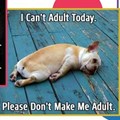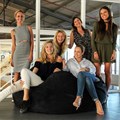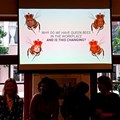#FairnessFirst: Fair chance to climb the career ladder of the future?

Melane was honest in his opening address of the conference, stating that he knew nothing of behavioural insights when he was first approached to take the role.
Here's where he made an impact - instead of either turning down the offer, as it wasn't his field of expertise, or taking it on without doing the required reading, he put in the time to find out what it's all about, upskilled himself and proved himself the ideal master of ceremonies.
He was thoughtful, clearly knew what the experts were talking about, and helped the dialogue progress. I'm not the only one who thought so...
Thank you @JohannvdNest. That is very kind of you to say. I am learning so much, and enjoying every moment of it. I hope you are having a good conference too. https://t.co/hkqzRPZhJp
— Africa Melane (@AfricaMelane) September 28, 2018
When we caught up in the morning tea break of the second day of the conference, I commended him on successfully MCing a subject that's not exactly mainstream.
Melane said it's unfortunately the case that many of our celebrities and media personalities have huge followings on social media, so they're seen as obvious choices for conference MCs and speakers - whether they have the expertise and interest in the topic or not.

While this works in creating hype for the event, unfortunately it can also backfire as attendees soon see the MC they know from their TV screen is just reading from a script prepared by the event organisers, not adding their own insights and linking findings to the real world.
It's that inauthenticity that often leads attendees to rate you lower on feedback forms, even if they can't quite put their finger on what was missing from the event.
That's especially true of the jargon-filled marketing and ICT conferences, but the same can be seen in any industry.
This links to influencer marketing, and the rising awareness that just because someone has a huge following doesn’t mean they’re a good fit as a brand ambassador.
It's easy to see why it happens, though. Jobs are few and far between, especially with the unemployment rate hovering around 25% in South Africa. As a result, many of us snap up the first thing that comes along, even if it doesn’t align with our passions.
That's not even looking at the inequality that still exists in access to basic education and the higher skills needed to enter most industries, as well as micro-privileges, like having books in the home during your childhood - but I've covered that in another article...
We need to learn to give a hand up, not just a hand out.
#TimeIsNow for women & men, girls & boys to help each other reach gender equality for all! #IWD2018
— Mona Juul (@mona_juul) March 7, 2018
GIF credit: @UN_Women pic.twitter.com/lQWHJXY1LA
Little wonder, as finding your own personal career path is tough. Very few know what they want to do the moment they enter the working world, and often we take on any opportunity that comes our way, give it our best shot, realise it's not for us and move on. That itself is not a problem. It's how business works.
The problem links to what Melane mentioned, of taking on opportunities that you know from the outset aren’t aligned to what you stand for, especially when someone else could do the job better. Queen bees abound.
But if we're hoping to move up the career ladder, especially with the fast rate of technological change and impact of the fourth industrial revolution, we can’t stand still or become stagnant behind our desks, assuming we've 'made it' once we're in the position we've always dreamed of. We need to constantly upskill ourselves, unlearn old ways and learn how to do our jobs better.More than this, we also need to mentor, upskill others and share that knowledge. That’s the key to creating a better business future for all.







































